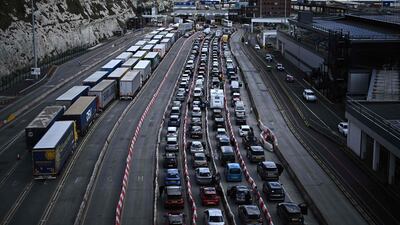New automated checks at EU borders should make life easier for British travellers, the European Commission said on Tuesday.
Britain, meanwhile, said it would welcome EU airports making more e-gates available for UK tourists.
There were many complaints of long traffic queues at English Channel ferry ports during the Easter weekend this month.
Strikes in France and extra border checks after Brexit were blamed for the disruption.
A new EU system that allows for automated checks on non-EU citizens is due to come into force within months.
UK citizens currently have their passports stamped manually.
No date has yet been set for the introduction of the EU’s digitised Entry/Exit System after several delays, amid uncertainty over how it might affect border queues.
Once it comes into force, visitors from approved countries such as the UK will have to register for travel authorisation online.
The authorisation, similar to the ESTA needed for travel to the US, would last for three years and cost €7 ($7.70).
A first trip to the EU under the new system will involve providing fingerprints and facial images.
But after that, passengers can scan their passports at self-service kiosks, the European Commission says.
“This will enable the automation of border controls and this should ease the experience of travellers at the border crossing points,” commission spokeswoman Anitta Hipper said on Tuesday when asked about UK visitors.
“You’ll have an automated system for third-country nationals once this is in place.”

The head of England's Port of Dover last year expressed concerns that the fingerprint-scanning system would cause extra delays.
An improved UK-EU atmosphere after a recent deal on Northern Ireland has raised hopes of closer co-operation.
But neither the EU nor the UK would confirm a report by Bloomberg that Prime Minister Rishi Sunak was lobbying for greater British access to European e-gates.
Downing Street said there were no “live discussions”.
“Of course we will always want to find ways to minimise unnecessary waiting times for British nationals,” Mr Sunak’s spokesman said.
“That would be welcome if there were wider use of e-gates for non-EU nationals, it’s in both our interests and the interests of the countries which British nationals visit as tourists, for example.”
Some airports in Spain and Portugal, where British tourists abound, have allowed UK visitors to use their e-gates.
Other arrival gates in Europe have no automated barriers and check both UK and EU travellers manually.
Under post-Brexit rules, British travellers can spend up to 90 days in the visa-free Schengen zone within a period of 180 days.
No visa is needed for short stays but people from Britain no longer have the automatic right to live and work in the EU.


